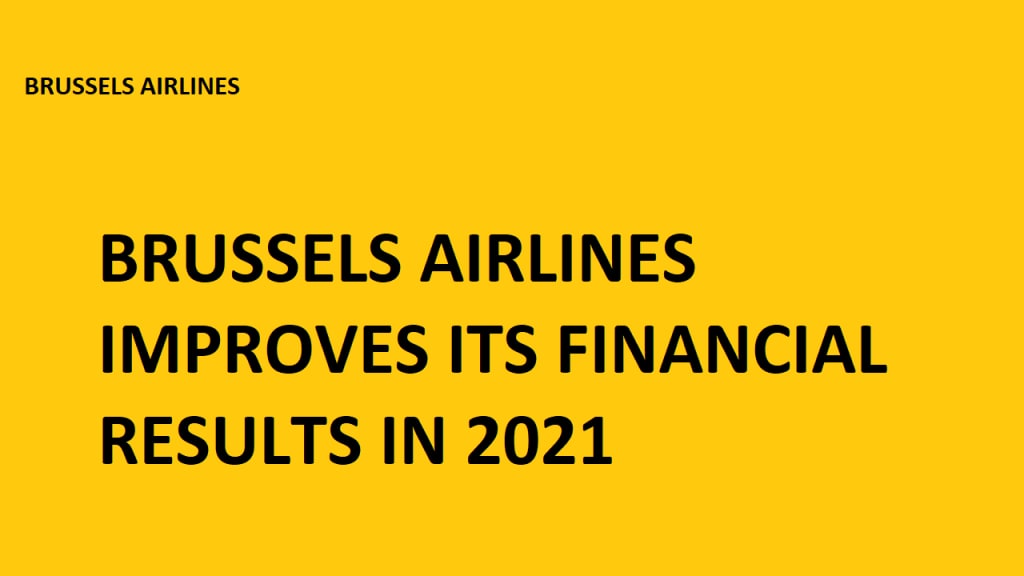BRUSSELS AIRLINES SUPPORTS INTERNATIONAL WOMEN’S DAY WITH AND ALL-FEMALE FLIGHT CREW TO MARSEILLE
BRUSSELS AIRLINES SUPPORTS INTERNATIONAL WOMEN’S DAY

The airline's EBIT was still severely hit by the COVID-19 pandemic.
Brussels Airlines reported a loss of EUR 189 million in the fiscal year 2021, which is an improvement of 35% from the prior year and in line with forecasts owing to the Covid-19 situation.
- Losses were minimised as a result of the Reboot Plus transformation plan's success and stringent cash management.
- Revenue increased by 35% to $560 million, although operational costs only increased by 5%.
- Numbers of passengers increased by 47% to 3.5 million.
Growth in network, fleet, and human resources in 2022
The Covid pandemic continued to have an impact in 2021, which necessitated a high level of resilience. Due to widespread lockdowns and high infection rates, the year began with an extremely constrained flying schedule. This was followed by a three-month travel restriction imposed by the Belgian government. The first quarter of Brussels Airlines was severely damaged by this travel ban. Book cheap flights with Brussels Airlines after this Covid pandemic.
The travel ban was overturned on April 19 and demand began to increase once more as the vaccination campaign also picked up speed. The demand increased quickly as the summer approached. In June, Brussels Airlines resumed full hub operations. By the summer, it had increased its capacity from 12% to 53% of pre-pandemic levels. Due to the impact of postponed travel plans and the urge to travel following the lockdown, the summer demand persisted longer than in past years. This robust and protracted summer peak contributed to a prosperous third quarter and the first profit since the pandemic's start. Rising infection rates and new limits in November contributed to a further decline in demand. Due to the emergence of the Omicron version, the end-of-year holiday saw a big travel peak before declining down to a lower winter demand.
After the Reboot Plus plan's reorganisation phase and the numerous modifications made, Brussels Airlines unveiled a new branding in November 2021 to emphasise its Belgian character and signal a fresh beginning following the coronavirus catastrophe. A crucial message to the market that the airline is here to stay was sent with the new identity. The choice was made in June 2021 to add three Airbus A320neos to the fleet of Brussels Airlines for the summer of 2023 as an additional sign of its future-readiness. Brussels Airlines makes a substantial advancement in the ongoing modernization of its fleet and lowers carbon and noise emissions in its medium-haul network with the addition of these new cutting-edge aircraft and the retirement of three older A319s.
The business and VFR sectors (visiting friends and relatives) had a major role in the continued strength of the African network's demand during 2021, but the European segment experienced greater volatility. In all, the capacity (Available seat-kilometers) for the entire year increased by 62% compared to 2020, and Brussels Airlines ran 39% more flights, carrying 3.5 million people (+47%).
At 67.2% (vs. 68.3% in the prior year), the passenger load factor was 1.1 percentage points lower than its level. Yields decreased by 6.9% following exchange rate adjustments. Revenue from traffic climbed by 31% to EUR 503m as traffic increased (previous year: EUR 384m).
Revenue increased 35% at EUR 560 million (previous year: EUR 414m). Operating income increased 31% to 599 million euros (previous year: EUR 456m). The growth in operating costs was constrained by the Reboot Plus cost-saving strategies and rigid cost control. They were just 5% higher than the prior year, at EUR 788m. Lower staff expenses (-17%) largely offset higher fuel costs (+62%) due to rising prices and volumes as well as higher taxes and charges (+55%).
At Brussels Airlines, Adjusted EBIT was EUR -189m in the fiscal year 2021. (previous year: EUR –293m). The Adjusted EBIT margin was -33.8% (down from -70.8% in the prior year). The EBIT was also -189 million euros (previous year: EUR –332m). Write-downs on the fleet totaling EUR 33 million had a negative impact on the value from the previous year.





Comments
There are no comments for this story
Be the first to respond and start the conversation.